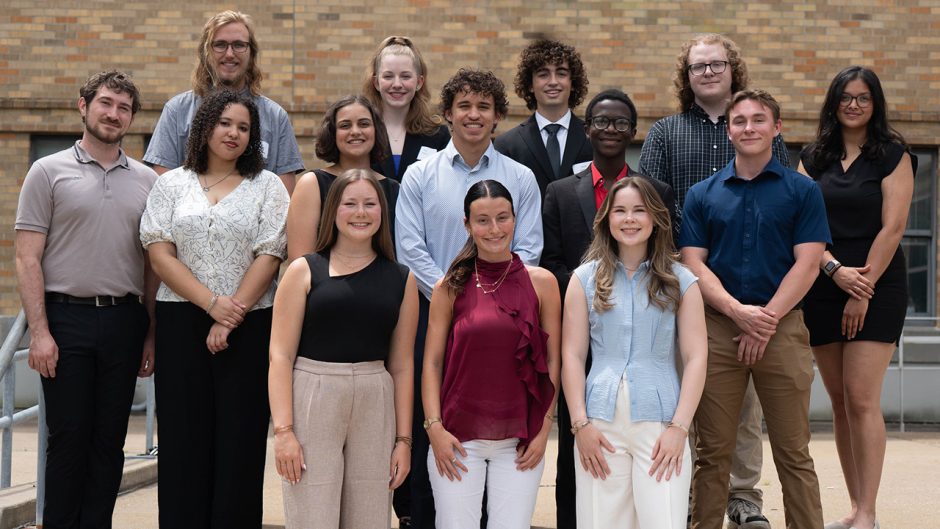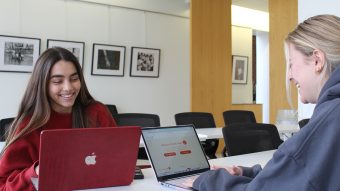
Sept. 4, 2025
Fifteen Honors College students at the University of Missouri pursued their academic interests through the nine-week Cherng Summer Scholars program this past summer—the largest cohort in the program’s history. The projects were individually designed by the students, with the support and mentorship of a Mizzou faculty mentor.
Since its creation in 2018, more than 80 Mizzou students pursuing the Honors Certificate have participated in research or creative scholarship projects through the Cherng Summer Scholars program.
“It is really incredible to see the distinct projects that our Cherng Summer Scholars work on each year,” Catherine Rymph, dean of the Honors College, said. “This program showcases the wide variety of research and creative scholarship work that is being done across campus. We are very thankful to the Cherng family for making an opportunity of this nature possible.”
Learn more about some of this year’s Cherng Summer Scholars:
Josiah Anderson, sophomore English major, College of Arts and Science
- Mentor: Phong Nguyen, professor of English and Miller Family Endowed Chair of Writing
An avid reader throughout high school, Josiah Anderson also spent plenty of time crafting his own stories. Anderson has continued his storytelling pursuits as a student at Mizzou and, this summer, explored those interests even further. Through the Cherng Summer Scholars program, Anderson developed three short stories centered around the theme of dysfunctional love.
Original story: Bringing Stories to Life
Nya Dodd, junior philosophy and psychological science double major, College of Arts and Science
- Mentor: Sean Lane, associate professor or psychological sciences
Nya Dodd jumped into her first research project last semester as part of the Regulation of Emotion, Addiction, and Conflict Trajectories (REACT) Laboratory, which focuses on the development of quantitative models of personality and psychopathology. Dodd conducted a meta-analysis last semester and looked at the relationship between borderline personality disorder symptomatology and existential anxiety. This summer, Dodd moved into the experimental design phase of the project. She developed an online survey that would help measure borderline personality disorder symptoms in participants.
Original story: Designing Her Own Research
Ava Fleury, junior biochemistry major, College of Agriculture, Food and Natural Resources
- Mentor: Timothy L. Domeier, associate professor of medical pharmacology and physiology; Margaret Proctor Mulligan Professorship in Medical Research
Ava Fleury’s research this summer focused on exploring the connection between atrial fibrillation and sleep apnea. Fleury said that for muscle cells to contract, like those in your heart, there are certain ions that must move in and out of those muscle cells. They must be precisely coordinated in order for the heart to beat rhythmically. If the flow of ions is uncoordinated, the heart starts to beat arrhythmically.
Original story: A Passion for Answering Questions
Graham George, sophomore German and international studies (peace studies) double major, College of Arts and Science
- Mentor: Seth Howes, associate professor of German
Graham George spent his summer as a Cherng Summer Scholar developing a braided lyric essay, which weaves at least two narratives together into a central theme. George wrote about politics in American and Europe – mainly Germany – while weaving in topics tied to cancer, biology and geography.
Original story: Gaining Valuable Insights
Nick Ice, senior biochemistry major, College of Agriculture, Food and Natural Resources
- Mentor: Kamal Singh, assistant professor of veterinary pathobiology; director of the Molecular Interactions Core
When Nick Ice arrived at Mizzou, he was looking for an opportunity to combine his interest in science with his desire to help others. Those passions led him to research. This summer, Ice led his own project tied to a specific parasitic infection, malaria. His work primarily centered on medication design tied to malaria.
Original story: Using Research to Help Others
Caitlin Mattingly, senior biochemistry major, College of Agriculture, Food and Natural Resources
- Mentor: John J. Tanner, professor of biochemistry and chemistry
Caitlin Mattingly’s research this summer focused on proline dehydrogenase (PRODH), an enzyme that is often found over expressed in cancer cells. Individuals in her lab have already found two inhibitors to PRODH, and Mattingly worked to better understand how those inhibitors function. The inhibitors are being explored as potential cancer treatments.
Original story: From Discovery Fellow to Cherng Summer Scholar
Thao Nguyen, junior electrical engineering major, College of Engineering
- Mentor: Syed Kamrul Islam, chair of the Department of Electrical Engineering and Computer Science; professor
Through the Cherng Summer Scholars program, Thao Nguyen led her own project tied to creating a device that can detect various viruses based on their permittivity and surface charge density. Nguyen’s research centers on semiconductors, specifically field effect transistors, a type of transistor that uses an electric field to control the current flow. Nguyen is working with silicon nanowire.
Original story: Solving Challenging Problems
Joseph Oyewusi, sophomore biological sciences and psychological sciences double major, College of Arts and Science
- Mentor: Jaume Padilla, professor of nutrition and exercise physiology
Joseph Oyewusi worked on a project tied to cardiovascular diseases in the context of obesity and diabetes at the Roy Blunt NextGen Precision Health building this summer. Oyewusi’s project is focused on confirming the link between two proteins in vascular cells, iRhom2 and ADAM17. iRhom2 has been shown to guide ADAM17 allowing for fundamental cell signaling by releasing various membrane-bound proteins.
Original story: Making an Impact Through Research
Pari Patel, senior computer science major, College of Engineering
- Mentor: Prasad Calyam, Curators’ Distinguished Professor in the Department of Electrical Engineering and Computer Science; director of the Cyber Education, Research and Infrastructure Center (Mizzou CERI)
Last year, Pari Patel found the perfect spot to follow her research interests through the Mizzou Cyber Education, Research and Infrastructure Center (Mizzou CERI), where she has been able to study confidential computing, a technology that protects data while it is being processed. Patel spent part of the summer conducting a literature review with a focus on finding other studies discussing confidential computing. She also worked on a variety of tasks with a team of researchers within the lab.
Original story: Making a Lasting Impact
Jane Ray, junior psychological sciences and interdisciplinary studies (women’s and gender studies) double major, College of Arts and Science
- Mentor: Lisa Flores, professor of psychological sciences
As a freshman at Mizzou, Jane Ray got involved in the Undergraduate Research Scholars Program offered through the Department of Psychological Sciences. The opportunity connected her with Lisa Flores, a professor of psychological sciences. This summer, Ray’s project is tied to previous research that Flores conducted focused on broadening the participation of women and Latinx individuals in engineering.
Original story: Making Research More Accessible
Alexandra Renoe, sophomore biological sciences and physics double major, College of Arts and Science
- Mentor: Pam Brown, associate professor of biological sciences; affiliate faculty in the Honors College
Alexandra Renoe’s research this summer through the Cherng Summer Scholars program focused on studying two proteins within Agrobacterium tumefaciens, a bacterium that causes tumors in plants. Those two proteins are crucial for polar growth, which allows the cells to build the cell wall and elongate, and if either of the proteins are removed, Agrobacterium tumefaciens can’t grow.
Original story: Jumpstarting Her Research Career
Natalie Schaefer, sophomore journalism and political science double major, Missouri School of Journalism and College of Arts and Science
- Mentor: Julius Riles, associate professor of communication; affiliate faculty in the Honors College
Natalie Schaefer spent part of her freshman year gaining valuable research experience through the ASH Scholars program, which supports teams of undergraduate research students in the arts, social sciences or humanities. Schaefer’s project this summer incorporated a lot of what she learned last semester through her ASH Scholars work. She’s performed a media dive into articles from across the globe that discuss immigration.
Original story: Publicizing Research Findings
Cole Stevens, senior health science major, College of Health Sciences
- Mentor: Aaron Stoker, director of the Thompson Laboratory for Regenerative Orthopaedics; research professor; affiliate faculty in the Honors College
Cole Stevens took a closer look at osteoarthritis this summer, with a goal of gaining a better understanding of the condition and the regulatory pathways associated with the pathobiology of it. Osteoarthritis is a common joint disease that is characterized by the breakdown of cartilage, which leads to pain, stiffness and reduced mobility.
Original story: Contributing to a Growing Field
Ashton Wooster, junior computer science and information technology double major, College of Engineering
- Mentor: Chi-Ren Shyu, professor of electrical engineering and computer science; director of the MU Institute for Data Science and Informatics
Ashton Wooster began a research project tied to quantum cybersecurity last year, and his work focused on how far he must space out circuits in a quantum computer before they begin leaking information to each other. That work transitioned into Wooster gathering data and detecting what sort of information he could learn from those circuits, which did identify potential threats. This summer, through the Cherng Summer Scholars program, he researched ways to mitigate or eliminate those threats.
Original story: Solving a Unique Problem
Zach Wright, sophomore biochemistry major, College of Agriculture, Food and Natural Resources
- Mentor: Dan Bergstralh, associate professor of biological sciences
Zach Wright spent his time as a Cherng Summer Scholar studying how epithelial tissues are formed and maintained in animal bodies. Epithelial tissues are the most common tissues found in animal bodies.
Original story: Reaching a Major Milestone



